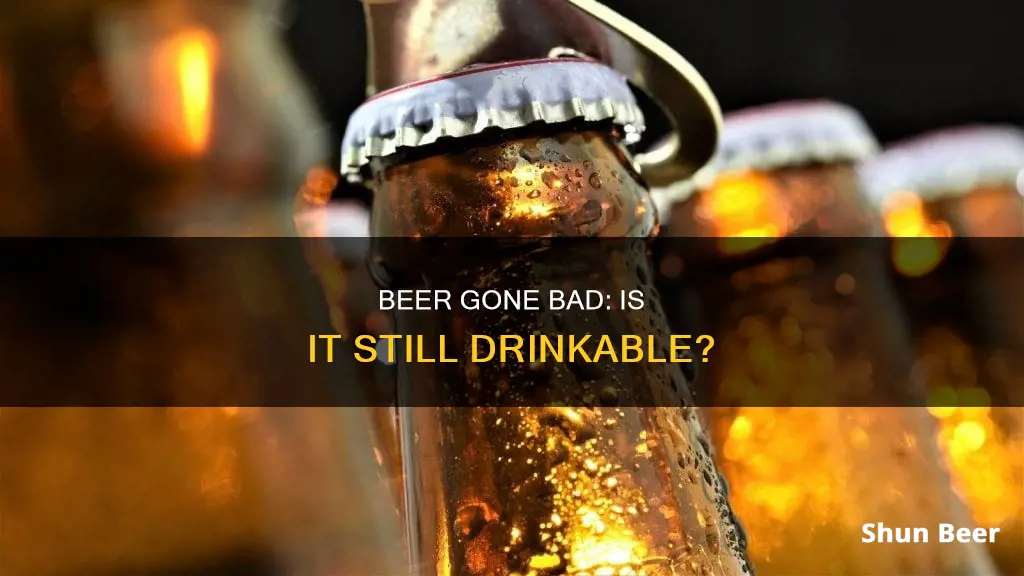
Beer is a beloved beverage for many, but what happens when it goes bad? Can you still drink it? Beer does expire, but that doesn't necessarily mean it's unsafe to consume. Expired beer will likely have an unpleasant taste and aroma, but it won't make you sick. This is because the fermentation process, low pH level, and alcohol content in beer create an unfriendly environment for microorganisms to thrive. However, it's important to note that this applies mainly to sealed bottles or cans. Once beer is opened, it has a shelf life of about a day, even when refrigerated.
Several factors contribute to beer spoilage. Firstly, light exposure, especially UV rays, can cause beer to develop a skunky odour and taste. This is more common in beers packaged in clear or green bottles, as brown bottles and aluminium cans offer better protection against UV rays. Secondly, heat speeds up oxidation, causing the beer to go bad more quickly. Refrigeration is crucial to maintaining freshness and slowing down oxidation. Lastly, oxygen exposure affects the compounds in beer, leading to oxidation and a disappointing papery or wet cardboard taste.
While drinking expired beer is generally safe, there are rare instances where it should be discarded. If the beer has lost its fizz, it indicates a broken seal, and the flavour will be significantly altered. Additionally, if a non-acidic beer develops a vinegary taste, it's a sign of bacterial contamination and should be avoided.
What You'll Learn
- Beer expiration dates are more of a guideline than a rule
- Drinking expired beer won't make you sick, but it won't taste good
- Beer stored in a refrigerator will last longer than beer stored at room temperature
- Beer stored in a dark place will last longer than beer exposed to light
- Beer in sealed bottles or cans will last longer than beer that has been opened

Beer expiration dates are more of a guideline than a rule
Beer does expire, but it doesn't mean it becomes unsafe to drink. The expiration date on a beer is more of a guideline than a rule. Beer is just like any other food in that it is made from all-natural, plant-based raw materials that naturally decay over time. No matter what extra steps brewers take to prevent beer from spoiling, there is nothing they can do to stop the natural growth of bacteria and chemical reactions as time passes.
Beer expiration dates are set by government authorities to ensure the responsible selling and consumption of beer. It is in the brewer's interest to keep their customers satisfied with great-tasting quality beer, so an expiry date is added to a beer can or bottle to let liquor stores know when to stop selling beer that may no longer be at its best quality.
The average shelf life of beer is around six to eight months without refrigeration. If stored and refrigerated properly, sealed beer can last beyond its expiration date by up to 12 months. Beer stored in a refrigerator can last up to two or three years.
However, this depends on the type of beer. Stronger beers, such as stouts and porters, tend to last longer than lighter beers like lagers and pilsners. Beers with a higher ABV (8% and above) can taste better with age, so leaving them on the shelf for a few years is ideal, provided they are stored properly.
There are several ways to tell if your beer has gone bad. One of the first ways is to pay attention to the noise your beer makes when you crack open the bottle or can. If there is an absence of the signature hissing sound, it means the beer has lost its carbonation. If your beer is fresh, you’ll often notice white foam rising to the top and spilling over.
Another way to tell is to inspect the label to check if it’s dusty – this is a good indication that the beer has been sitting on the shelf for a while. You could also hold the bottle up to the light and check for any sediments settled at the bottom.
If you do notice this, it’s probably best to avoid drinking the beer. However, there is an exception to this. In some beer styles such as German Weissbier, Belgian Dubbel, etc., which are bottle-conditioned, yeast sediments are not considered a flaw.
You could also check for leakage around the sealed mouth of the bottle – which may be an indication that the bottle and its contents have been subjected to high levels of heat at some point.
Finally, if all else fails, just take a sip. You’ll taste the flatness, ‘off’ flavours and skunky aromas right away, and know that your beer has lost its quality.
Beer and Cannabis: Safe Consumption Explored
You may want to see also

Drinking expired beer won't make you sick, but it won't taste good
Drinking expired beer is unlikely to make you sick, but it won't taste good. The fermentation process used in brewing, as well as the low pH level and alcohol content, make beer an unfriendly environment for bacteria and other microorganisms. Even if a beer sits on the shelf for years, it is unlikely to pose any health risks if it has been sealed.
However, the taste of beer does change over time, and it may become unpleasant. The longer a beer is stored, the more its flavour compounds interact with oxygen, leading to oxidation and a disappointing, papery taste. Heat speeds up oxidation, so it's best to store beer in a refrigerator. Major temperature changes and exposure to sunlight can also negatively impact the taste of beer.
Some types of beer, such as IPAs, are best consumed fresh, as they gradually lose their flavour and aroma over time. On the other hand, richer and higher ABV varieties, such as porters and stouts, can improve with age, especially when stored in cool, dark conditions.
If you do choose to drink expired beer, it's important to inspect it first. If there is an absence of the signature hissing sound and foaming when you open it, the beer has lost its carbonation and is flat. A vinegary taste is also an indication that bacteria have gotten into the beer, and it should be discarded.
Exploring Beer Drinking on the San Marcos River
You may want to see also

Beer stored in a refrigerator will last longer than beer stored at room temperature
Beer is perishable and will eventually go bad, but it is safe to drink past its expiration date. Beer typically lasts for 5 to 9 months beyond the expiration date listed on the label if stored at room temperature. However, when stored in a refrigerator, beer can last up to 2 to 3 years past its expiration date. This extended shelf life is due to the reduced temperature slowing down the chemical reactions that cause the beer to spoil.
The ideal temperature for storing beer is between 45° F and 55° F, which is colder than room temperature but warmer than a refrigerator. If you choose to store beer at room temperature, it is best to keep it in a cool, dark room with minimal temperature fluctuations, such as a basement. Beer should also be kept upright to minimize the surface area exposed to oxidation.
While beer can be safely consumed beyond its expiration date, the taste and quality will gradually deteriorate. Over time, beer will undergo oxidation, which can result in the development of unpleasant flavours such as tones of sherry, paper, or cardboard. Hop aromas will fade, and the beer may become overly bitter or sweet. Additionally, light exposure, especially UV rays, can cause beer to develop a skunky odour and taste.
It is important to note that the type of beer also affects its shelf life. Higher ABV beers, such as stouts and barley wines, tend to improve with age, while IPAs and other hoppy beers are best consumed fresh as they gradually lose their flavour and aroma.
Drinking Beer in Phoenix Parks: What's Allowed?
You may want to see also

Beer stored in a dark place will last longer than beer exposed to light
Beer is best stored in a dark place, away from sunlight and UV light exposure. This is because UV rays can cause a chemical reaction in the beer, breaking down its flavour components until it smells and tastes like skunk spray. This process is known as "skunking" or "lightstrike". Beer that has been exposed to sunlight for too long is said to have been "skunked" or "lightstruck".
Beer should also be stored in a cool place, as cold temperatures slow down the aging process. The ideal temperature for storing beer is between 50 and 55 degrees Fahrenheit. Beer stored in a refrigerator can last up to two or three years, while beer stored at room temperature will last about five to nine months beyond the expiration date listed on the label.
In addition to light and temperature, there are a few other factors to consider when storing beer:
- Beer should be stored upright, rather than on its side, to minimise oxygen exposure and prevent leaks.
- Beer should be stored in a stable location, where it won't be bumped or moved frequently, as shaking can cause aeration.
- Beer should be consumed as fresh as possible, as the taste will deteriorate over time.
By following these guidelines, you can help ensure that your beer stays fresh and flavourful for as long as possible.
Beer Drinking: Healthy Habit or Harmful Vice?
You may want to see also

Beer in sealed bottles or cans will last longer than beer that has been opened
The reason for this difference in longevity is that an unopened beer is protected from the elements. Oxygen, heat, and light are the three main culprits that can cause a beer's flavour to go awry. Oxygen interacts with the compounds from malt, yeast, and hops, causing oxidation and a papery taste. Heat speeds up oxidation, and light exposure, especially ultraviolet (UV) rays, can cause the hop-derived compounds in beer to break down and combine with sulphuric compounds, resulting in a skunky odour and taste.
Additionally, the type of beer also affects its shelf life. Stronger beers with higher alcohol content, such as stouts and barley wines, tend to improve with age. On the other hand, IPAs, especially hoppy ones, gradually lose their flavour and aroma over time and are best consumed fresh.
To maximise the shelf life of your beer, it is recommended to store it in a cool, dark place, preferably a refrigerator. If storing at room temperature, choose a cool, dark room with minimal temperature fluctuations, such as a basement or cellar. Keeping the beer upright also helps minimise oxidation.
Dialysis and Root Beer: Is It Safe to Drink?
You may want to see also
Frequently asked questions
Drinking expired beer will not make you sick, but it will not taste good. The chemicals in the brew will have degraded, and it will probably smell strange.
Beer has a shelf life of about 6-12 months in the fridge, but if you're not a fan of drinking flat beer and want to prolong its lifespan, store it in a cool, dark place.
You'll know your beer has gone bad if it has a dusty or cloudy layer at the bottom of the bottle, indicating yeast formation. It might also smell sour or funky, or taste flat and unappealing.







